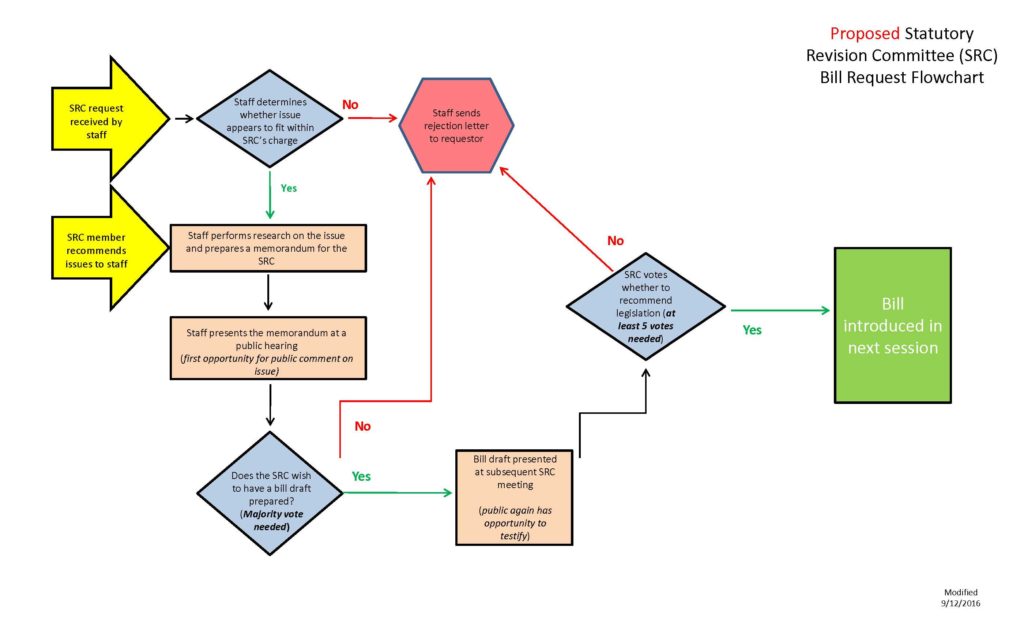by Kate Meyer
In August, Legisource told you about the Statutory Revision Committee (SRC), a recently rebooted entity that examines the Colorado Revised Statutes to develop legislation that will modify or eliminate antiquated, redundant, or contradictory rules of law and to bring the statutes of this state into harmony with modern conditions. Since that article was published, the SRC has been hard at work, meeting three times and ultimately approving 15 bills for introduction in the 2017 legislative session.
Committee process. Bill ideas can originate from any number of sources: Committee members or other legislators; legislative staff; jurists, attorneys, and other legal professionals; executive agencies; lobbyists; the public; etc. In its first meeting, the SRC adopted the following basic process for considering potential bills:
(Click image to enlarge)
The process starts when the SRC’s staff from the Office of Legislative Legal Services receives or creates a bill proposal and initially decides whether the proposal fits within the committee’s charge. Persons may submit bill proposals identifying possible defects or anachronisms in the law or possible antiquated, redundant, or contradictory laws by contacting a committee member or sending an e-mail to SRC staff at StatutoryRevision.ga@coleg.gov
If staff finds that a bill proposal fits within the committee’s charge, they schedule it for committee discussion. The SRC’s process affords interested persons two opportunities to comment publicly on potential legislation:
- First the public may testify at an initial meeting when the SRC receives a memorandum describing the genesis, scope, and intent of the proposed bill. The SRC then votes whether to have a draft bill prepared.
- Second, for proposals for which the staff writes drafts, the public may testify at a subsequent meeting when the SRC votes whether to recommend bills for introduction. An affirmative vote from at least five members of the SRC is required for a bill to be introduced, ensuring that every bill has bipartisan support.
The staff includes memoranda and bill drafts with the SRC agendas, which are posted on the SRC’s website one week in advance of a meeting date. And of course, the chance to weigh in on bills doesn’t end with the committee. Each introduced bill is debated and vetted through normal how-a-bill-becomes-a-law legislative procedures.
Bills approved in 2016. Every bill recommended for introduction from the 2016 SRC proceedings received unanimous committee approval. The breadth of bill subjects typifies the SRC’s ability to consider a wide range of topics, including:
- Repealing obsolete congressional and state legislative district laws;
- Aligning statutory reporting requirements with section 24-1-136 (11), C.R.S.;
- Updating certain outdated references to standards promulgated by the American National Standards Institute;
- Removing “ghost statutes” inadvertently left on the books in 2016; and
- Implementing recommendations received from the Department of Education and the Office of the State Auditor to modernize and correct various statutes related to those entities.
To read the full text of the approved bills, please see the SRC’s 2016 Annual Report and the upcoming supplement on the SRC’s website.
Looking ahead. Although the SRC expects to conduct the majority of its work during legislative interims, the committee will meet early in the 2017 session (date TBD) to select a new chairperson and vice-chairperson; to continue analyzing bill drafts that reconcile reporting requirements with section 24-1-136 (11), C.R.S.; and to consider a fix to the “Uniform Trust Decanting Act.”
Among the topics the SRC will discuss in the 2017 interim is a comprehensive bill to modernize, without substantively changing, the transfer terminology used in the Colorado Revised Statutes relating to the organization of state governmental agencies under the “Administrative Organization Act of 1968.”
Additional information. To learn more about the SRC, please contact a committee member or send an e-mail to SRC staff at StatutoryRevision.ga@coleg.gov. You may also check out a brief video detailing the SRC posted on the Colorado Channel’s website.

